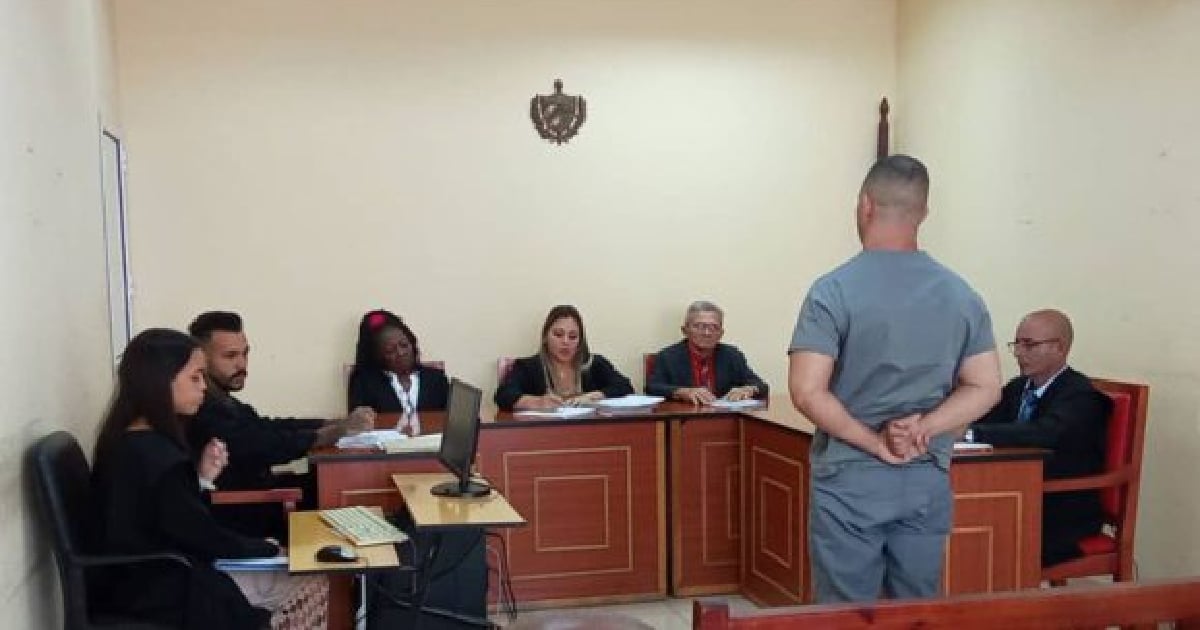
This week, the Cuban regime carried out more than 3,300 arrests and exemplary trials across all provinces of the country, including cases related to corruption, as part of its latest crackdown on crime, according to official media sources.
Under the name National Exercise for the Prevention and Confrontation of Criminal Activities, Corruption, Illegality, and Social Indiscipline in the country, the large-scale operation took place from December 2 to December 7.
In less than a week, over 800 police operations and closures were conducted in cities, access roads through checkpoints, the National Highway, and other roads, reported Colonel Deniset González, head of information and analysis for the National Revolutionary Police (PNR), during the television program "Mesa Redonda" last Friday.
During those controls, 4,000 actions were carried out, which González referred to as "preventive, prophylactic", resulting in the detention—"transfer to police stations", according to the official—of more than 3,300 people allegedly involved in crimes and illegal activities.
"In this operation, investigative processes have been completed, individuals involved have been arrested, a significant amount of money and assets acquired as a result of these activities have been seized, and a group of synthetic cannabinoids has also been confiscated," he detailed. "In all these cases, those involved are in custody, and investigations are ongoing to expand possible criminal networks, identify methods of operation, and disrupt supply chains that may continue to impact our society."
According to the Deputy Attorney General, Marcos Caraballo de la Rosa, the government provided "a strong response to preserve one of the revolution's most cherished achievements: citizen tranquility."
In just five days, the Prosecutor's Office imposed over 300 precautionary measures, with 83% of them involving provisional imprisonment for crimes such as drug trafficking and corruption.
Caraballo reported that "several processes associated with serious corruption, which are even controlled by the country's leadership, have been concluded," leaving in suspense which cases he was referring to, although he might have been alluding to the ongoing investigation into corruption involving former Deputy Prime Minister Alejandro Gil Fernández, who was dismissed last February.
"Four cases have been submitted to the courts, in which we are participating in the trials, as is customary, to ensure a penal response commensurate with their severity and the characteristics of the individuals involved," the Deputy Attorney General emphasized, adding: "We are dealing with corruption cases that involve many people, including those with criminal networks, such as executives, officials, employees, and others who conspired to appropriate the goods, financial resources, and materials necessary for the country's development."
Maricela Sosa Ravelo, Vice President of the Supreme People's Court of Cuba, justified the conduct of exemplary trials as part of the TSP's mission to administer justice "on behalf of the people of Cuba."
The senior official mentioned that trials of this nature were held for drug-related offenses in Havana, Camagüey, and Pinar del Río; and nine other cases were conducted for cattle theft or the sale of meat from illegal slaughter in Granma, Artemisa, Mayabeque, and Santiago de Cuba.
In two exemplary hearings, individuals were judged for administrative corruption and embezzlement in Havana and Matanzas, while additional trials were held for theft and robbery with force in Mayabeque, Villa Clara, and Santiago de Cuba.
Sosa warned that "citizen tranquility is essential, and therefore, acts committed against our agents of the Ministry of the Interior are serious offenses." In this regard, he mentioned the holding of three exemplary trials in Santiago de Cuba and Guantánamo, without providing further details.
According to the vice president of the Supreme Court, "all these trials were conducted with due process, adhering to each of the guarantees established in Articles 94 and 95 of the Constitution as well as our procedural laws."
The regime of Miguel Díaz-Canel has launched a new campaign against crime and corruption, amid recent scandals involving his stepson Manuel Anido and Sandro Castro, the grandson of the late dictator Fidel Castro.
The Cuban leader stated that this exercise, "understood as taking place between two dates of revolutionary struggle," aimed to "address the negative trends that exist in our society."
In addition to the manifestations of corruption, crimes, and illegal activities, the regime has aimed to rigorously pursue “social indiscipline, antisocial behavior, tax evasion, distortions between the state and private sectors, speculative pricing, and anything that affects public tranquility.”
Last March, after the announcement of the investigation against former Deputy Prime Minister Gil for "serious errors" and corruption, Díaz-Canel warned that there would be no tolerance for a lack of exemplary behavior under his government.
Frequently Asked Questions about the Anti-Corruption Operation in Cuba
How many people were arrested in the recent operation by the Cuban regime?
In the recent government operation called the National Exercise for Prevention and Combat Against Criminal Activities, more than 3,300 people were arrested in less than a week in Cuba. These arrests took place during over 800 operations and police closures across the country.
What crimes were addressed during the National Exercise of prevention and confrontation this week?
During the National Prevention Exercise, crimes such as corruption, drug trafficking, theft, and illegal slaughter of livestock were addressed, among others. Additionally, exemplary trials were conducted across all provinces.
What justification did the Cuban regime provide for these arrests and exemplary trials?
The Cuban regime justified the arrests and exemplary trials as a response to "preserve citizen tranquility," which it considers "one of the most valued achievements of the revolution." However, these actions reveal deep fissures in legality and state management.
How has the Cuban population reacted to the increase in repression and state control?
The Cuban population faces a climate of uncertainty and social unrest due to "repression and arbitrary arrests" employed by the government to maintain control. These measures have not addressed structural issues and have increased distrust toward the regime.
Filed under: